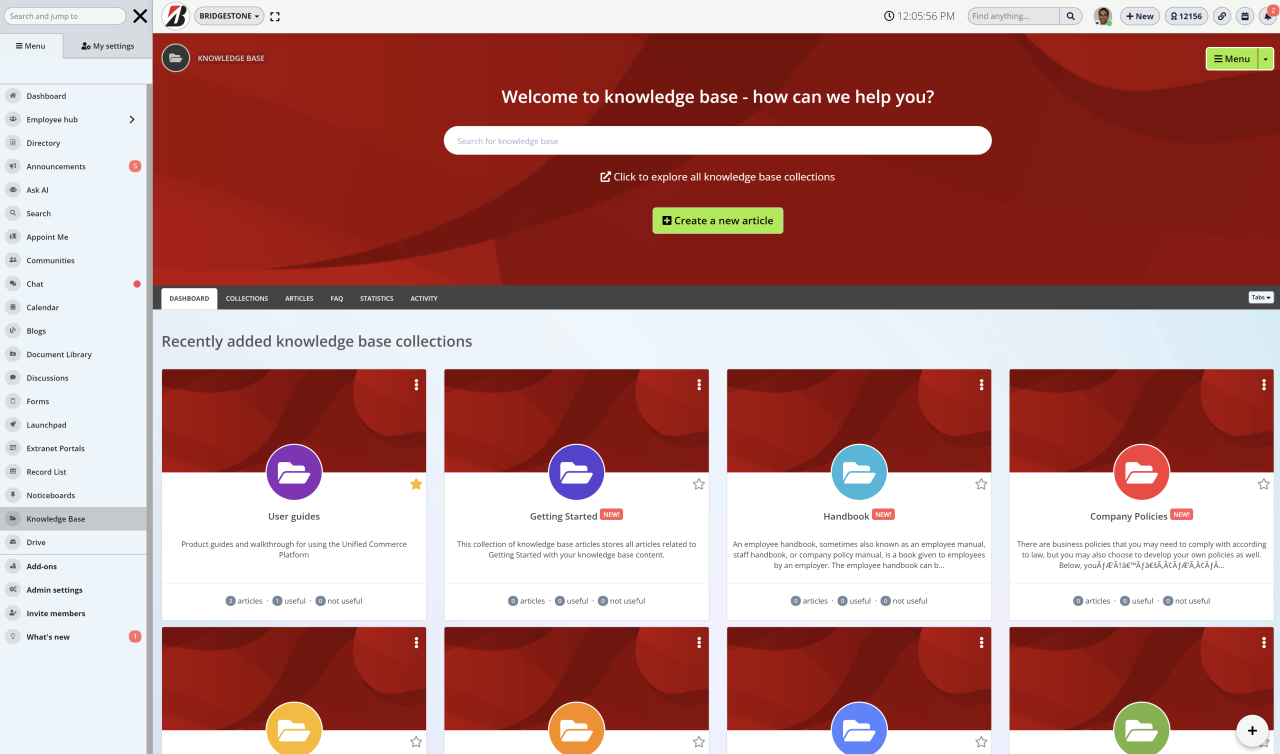Insight Blog
Agility’s perspectives on transforming the employee's experience throughout remote transformation using connected enterprise tools.
21 minutes reading time
(4202 words)
Enhancing Your Hiring Process through Knowledge Management in HR
Efficient knowledge management in HR is crucial for successful hiring. But it will also help maximize talent retention. Discover tips to improve your workplace.
Within the complex landscape of modern organizational dynamics, the human resources field bears many responsibilities, serving as the conductor of essential functions crucial for operational efficiency.
It encompasses a blend of internal mechanisms such as personnel management, fostering company culture, evaluating performance, managing interpersonal relationships, conducting orientation programs, and more, embodying the core of cognitive management within HR.
On the other hand, leaders in human capital management wield significant influence in shaping policies, fortifying brand identity, ensuring compliance with regulations, nurturing talent, and constantly seeking new skills, thereby playing a pivotal role in the organizational ecosystem.
Undoubtedly, the foundation of the HR framework relies heavily on astute cognitive governance, a fundamental pillar for navigating the intricacies of organizational needs.
Exploring the nuances of cognitive governance within HR and identifying key areas to bolster the hiring process in 2024 becomes an essential discussion.
In this article we, we will be touching on Knowledge Management in HR; lets get into this.
Training on Compliance and Cultural Integration for Knowledge Management in Human Resources
Compliance and culture are the bedrock of a robust employer brand, which is pivotal for fostering employee satisfaction and attracting top talent. Why are they crucial?
Potential hires seek assurance that your company prioritizes their well-being and safeguards their rights through robust policies. Hence, comprehensive culture and compliance training for HR professionals becomes indispensable in achieving these objectives.
Consider diversity, equity, and inclusion (DEI) training. Staying abreast of DEI practices is essential for HR teams to foster an inclusive environment and attract diverse talent pools. Similarly, adherence to payroll and regulatory compliance standards is vital, as applicants expect their rights to be upheld.
Effective communication of these policies and company values to applicants ensures that the best candidates are drawn to your organization. Moreover, culture plays a pivotal role in shaping the candidate's experience.
HR experts must adeptly convey the brand's culture and values during hiring, creating a sense of safety, respect, and appreciation for potential employees.
This fosters an environment where individuals can thrive and contribute meaningfully to the company's success.
Getting to Know Your Applicants and Their Requirements
Training HR professionals on target demographics is pivotal in optimizing the hiring process. It equips HR experts with the tools to analyze and select ideal candidates effectively.
In today's landscape, managing high volumes of applications can be daunting. However, with proper education, HR teams can streamline this process. Firstly, understanding the needs of ideal candidates is paramount.
For instance, do they seek a specific company culture? What are their salary and benefits expectations? How do they perceive work culture and workflows? Are they inclined towards fixed work schedules or prefer flexible arrangements like shift bidding? Answering these questions beforehand ensures alignment of expectations.
Secondly, educating HR experts on company requirements and goals—whether short, mid, or long-term—empowers them to craft tailored applicant profiles.
This not only facilitates efficient applicant prioritization but also enhances the overall effectiveness of the hiring process.
- Detailed Application Forms: Design comprehensive application forms using free tools that require applicants to provide detailed information about themselves, their qualifications, experiences, and the specific requirements for the position. This helps us understand their background and expectations.
- Structured Interviews: Conduct structured interviews where you ask specific questions related to the job role, as well as about the applicant's goals, work style, and preferences. This allows you to delve deeper into their requirements and assess their suitability for the role.
- Skills Assessments: Implement skills assessments or tests relevant to the job role. This provides valuable insights into the applicant's abilities and helps you understand if their skills align with the position's requirements.
- Reference Checks: Contact the references provided by the applicants to gain a better understanding of their past performance, work ethic, and compatibility with the job requirements. This provides a more holistic view of the applicant's capabilities.
- Open Communication Channels: Maintain open communication channels with the applicants throughout the hiring process. Please encourage them to ask questions and provide feedback on their requirements and expectations for the role. This fosters transparency and helps in aligning expectations from both parties.
Developing and Communicating Diversity, Equity, and Inclusion (DEI) Policies for HR Knowledge Management
In HR education and knowledge management, fostering Diversity, Equity, and Inclusion (DEI) through training and policy implementation is a cornerstone of a reputable employer brand.
DEI initiatives require ongoing education to keep HR professionals abreast of evolving market trends and demands. Beyond mere compliance, staying attuned to these shifts is vital for attracting top-tier talent and fostering long-term employee retention.
When outsourcing recruitment, partnering with top-tier recruitment process outsourcing firms proficient in DEI protocols is essential. Ensuring policy adherence throughout the recruitment process is paramount. While outsourcing can be beneficial, close collaboration with the external team is necessary to align with your specific DEI objectives.
Concrete organizational policies serve as the bedrock for promoting workplace diversity, equity, and inclusion. Serious applicants prioritize companies with established DEI frameworks.
HR and legal teams must craft these policies and ensure their accessibility to facilitate effective implementation. Establishing a robust knowledge management platform enables recruiters, managers, and HR professionals to easily access crucial company information for informed decision-making during hiring and onboarding processes.
More than merely mentioning DEI commitments in job descriptions is required. HR experts must communicate these values throughout the hiring process and substantiate them with relevant documentation.
For instance, if you're promoting diversity initiatives, you could cite specific examples of past initiatives your company has undertaken, such as hosting diversity workshops, implementing blind hiring practices, or showcasing diversity statistics within your workforce.
Developing and communicating Diversity, Equity, and Inclusion (DEI) policies for HR knowledge management involves several crucial steps to ensure effectiveness and alignment with organizational values.
Here's a structured approach:
- Assessment and Research:
- Understand the current state of diversity, equity, and inclusion within the organization.
- Conduct surveys, interviews, or focus groups to gather employee insights regarding their experiences and perceptions.
- Research best practices and legal requirements related to DEI in HR management.
- Establishing Objectives:
- Define clear objectives and goals for DEI initiatives in HR knowledge management.
- Align these objectives with the organization's mission, vision, and values.
- Ensure that objectives are specific, measurable, achievable, relevant, and time-bound (SMART).
- Policy Development:
- Draft DEI policies that address recruitment, hiring, promotion, training, and knowledge management processes.
- Ensure policies are inclusive and considerate of various identities, including but not limited to race, gender, ethnicity, sexual orientation, age, disability, and religion.
- Incorporate language that promotes equity and fairness in all HR practices.
- Review and revise policies to eliminate bias and ensure compliance with legal regulations.
- Consultation and Collaboration:
- Involve key stakeholders in the policy development process, including HR professionals, managers, employees from diverse backgrounds, and DEI experts.
- Seek feedback and input from various departments and levels of the organization to ensure inclusivity and buy-in.
- Communication Strategy:
- Develop a clear communication strategy to introduce and explain the new DEI policies to all employees.
- Utilize multiple communication channels such as company-wide meetings, email newsletters, intranet portals, and training sessions.
- Tailor messaging to resonate with different employee demographics and address potential concerns or questions.
- Training and Education:
- Provide training sessions for HR staff and managers on effectively implementing and enforcing DEI policies.
- Offer educational programs for all employees to raise awareness about unconscious bias, microaggressions, and inclusive behaviors.
- Foster a culture of continuous learning and growth by providing resources for self-education on DEI topics.
- Evaluation and Accountability:
- Establish metrics and Key Performance Indicators (KPIs) to measure the effectiveness of DEI initiatives in HR knowledge management.
- Regular assessments and surveys should be conducted to monitor progress and identify areas for improvement.
- Hold leaders and managers accountable for promoting diversity, equity, and inclusion within their teams and departments.
- Adaptation and Evolution:
- Stay flexible and open to feedback, adjusting DEI policies and strategies based on evolving organizational needs and external factors.
- Continuously seek opportunities to innovate and enhance DEI efforts in HR knowledge management.
By following these steps, organizations can develop and communicate DEI policies for HR knowledge management that foster an inclusive workplace culture and support the success and well-being of all employees.
Follow us and access great exclusive content everyday: Follow us on Google News
How to Grasp the Basics of Cybersecurity in the Digital Era
In today's digital landscape, hiring processes are predominantly conducted online, offering an efficient and effective way to reach a wider audience and tap into a younger talent pool.
However, this shift also exposes organizations to spam, scams, and other malicious online activities, posing risks to data security. Investing in HR cybersecurity training becomes crucial to mitigate these threats.
Implementing such training can safeguard your hiring funnel from being clogged with spam or compromised by cyber threats. A proactive approach involves erasing company data from data brokers to minimize exposure to spam emails.
Moreover, educating HR professionals on identifying phishing emails and scam attempts is paramount. They should be equipped with essential knowledge of email security practices, including the importance of strong passwords, two-factor authentication, and recognizing spam keywords.
Additionally, refraining from clicking on links or downloading files from suspicious emails is vital in maintaining data integrity and organizational security.
Here are five examples of cybersecurity threats that HR professionals should be aware of:
- Phishing Emails: Cybercriminals often send deceptive emails that appear to be from legitimate sources, aiming to trick recipients into revealing sensitive information or downloading malware.
- Ransomware Attacks: This type of malware encrypts files on a victim's computer and demands payment for their release. HR departments may be targeted to disrupt operations or steal employee data.
- Social Engineering: Attackers manipulate individuals into divulging confidential information or performing actions that compromise security. HR personnel could be targeted through social media or phone calls and positioned as company executives.
- Insider Threats: Employees or former employees with access to sensitive data may intentionally or inadvertently misuse it. To mitigate this risk, HR should implement access controls and monitor for suspicious behavior.
- Credential Stuffing: Attackers use previously stolen username and password combinations to gain unauthorized access to accounts. HR professionals should enforce strong password policies and implement multi-factor authentication to protect against this threat.
Sharing knowledge with team members examples
Organizations have embraced diverse strategies to cultivate knowledge sharing, resulting in notable employee growth and substantial company advantages.
Let's examine two distinct instances of successful knowledge-sharing endeavors.
Smithson, a prominent international consulting firm with 900 consultants, specializes in complex financial analysis. Smithson employs a mentoring system to promote knowledge exchange, pairing new consultants with seasoned professionals. This strategic pairing streamlines the onboarding process and enhances its efficacy, allowing new hires to grasp crucial insights swiftly. Experienced mentors offer invaluable guidance through these mentorship relationships, enabling junior consultants to accelerate their learning beyond traditional training methods. A staggering 90 percent of Smithson's employees rate it as an outstanding workplace.
In the domain of renewable energy technology, SolarTech confronts the task of disseminating specialized engineering knowledge regarding solar power systems. SolarTech hosts monthly forums where engineers convene to discuss and exchange ideas to democratize this critical knowledge and foster an innovation environment. This platform facilitates the sharing of expertise and prepares employees for internal growth opportunities. Participants laud the program for creating a vibrant learning atmosphere where individuals of diverse backgrounds and skill sets can mutually benefit.
These unique knowledge-sharing approaches have propelled Smithson and SolarTech to new levels of success, empowering their workforce and fostering a culture of continuous learning within their respective organizations.
Here are a few other sharing knowledge with team members examples:
Harnessing Automation for HR Knowledge Management
Consider integrating automation training into your knowledge management strategy to enhance HR operations' efficiency significantly.
Explore various automation tools and techniques to streamline different HR processes.
Some examples include:
- Crafting engaging and inclusive job descriptions.
- Implementing automated background checks for efficient candidate screening.
- Automating the onboarding process to ensure a smooth transition for new hires.
- Using automated systems for performance monitoring and generating insightful reports.
- Leveraging automation in talent sourcing and outreach efforts to reach a wider pool of candidates.
To maximize the effectiveness of these automation tools, conduct a thorough analysis of your HR workflows to identify bottlenecks and areas that require improvement. Look to industry leaders such as Google for inspiration on optimizing your processes.
For instance, Google automates managerial tasks to facilitate seamless onboarding experiences. This includes automated coworker introductions, scheduled check-ins, and task delegation, allowing managers to guide new hires into their roles efficiently.
You may also like: Best Apps for Employees: UPDATED 2022 – A Complete Guide
Best Practices for HR Knowledge Management
HR knowledge management transcends mere administrative duties; it represents a transformative strategy capable of reshaping the employee experience and enhancing the efficiency of various HR functions.
Consider the following best practices for optimizing HR knowledge management and harnessing organizational knowledge effectively.
#1. Establish Centralized Knowledge Repositories
Ideas for knowledge sharing activities and centralizing knowledge resources is a foundational step in effective HR management. This practice involves consolidating vital HR information into a unified platform or system, including employee databases, policy documents, and procedural manuals. Centralization simplifies access to information, ensuring consistency and accuracy across all data sources.
A centralized knowledge repository enables HR professionals to work with the latest and most reliable information, facilitating informed decision-making and strategic planning.
Free ebook: How To Get Your Intranet Off The Ground
#2. Establish Clear Communication Channels
Knowledge sharing in the workplace is very important, also effective communication is paramount for seamless knowledge exchange within the HR department. This entails setting up protocols and platforms where team members can readily share information, ask questions, and offer feedback. Whether via email, instant messaging, or dedicated communication tools, the chosen channels should facilitate real-time interaction and collaboration.
Transparent communication channels foster transparency, improve team coordination, and guarantee that all members have access to the information necessary for optimal performance in their roles.
#3.Encourage knowledge sharing
Emphasize Knowledge Sharing In HR knowledge management, prioritizing knowledge sharing is essential. This entails encouraging HR professionals to exchange their expertise, experiences, and insights with their peers. Knowledge sharing can be facilitated through workshops, seminars, and online forums. It's equally important to cultivate an environment where team members feel safe sharing their knowledge, free from criticism or judgment.
Organizations cultivate a collaborative culture by emphasizing knowledge sharing, improving team competency, and fostering problem-solving and innovation, here are some knowledge sharing examples.
- Innovation Incubator: This technology company hosts an annual "Innovation Fair," a platform where employees can showcase their innovative projects and ideas. The fair not only provides recognition and support to winners, but also serves as a catalyst for further development of their concepts. This initiative not only encourages knowledge sharing but also sparks creativity across teams, inspiring everyone to explore their innovative potential.
- Learning Lunches: A marketing agency holds monthly "Learning Lunches," where employees are encouraged to present on topics of interest, such as new marketing trends, tools, or case studies. These informal sessions promote cross-departmental knowledge sharing and professional development.
- Skill Swap Sessions: At a software development firm, employees come together for quarterly "Skill Swap Sessions." These sessions are not just about learning new skills, but also about sharing and teaching each other. This peer-to-peer learning approach fosters a culture of collaboration and continuous skill development, creating a sense of unity and shared growth among the team.
- Knowledge Awards: In a consulting firm, the management recognizes employees who actively contribute to knowledge sharing through an annual "Knowledge Awards" ceremony. Winners are chosen based on their efforts in mentoring, creating learning resources, or facilitating workshops, incentivizing a culture of sharing expertise.
- Cross-Functional Projects: A manufacturing company encourages knowledge sharing by assigning cross-functional teams to projects. The company fosters collaboration and the exchange of diverse perspectives and skills by bringing together employees from different departments, such as engineering, production, and sales.
#4. Maintain a Current HR Knowledge Base
Keeping the HR knowledge base current is crucial to ensure its relevance and usefulness. This includes regularly reviewing, updating, and organizing the content to align with the latest industry trends, organizational policies, and best practices. Any outdated or inaccurate information should be promptly corrected or removed to uphold the integrity of the knowledge base.
Your role in this process is crucial. Regular updates ensure that you, as part of the HR team, can access up-to-date and accurate information. This is not just for your benefit, but it's essential for informed decision-making and strategic planning. Your active involvement in this process is what keeps our HR processes running smoothly and effectively.
#5. Invest in an Effective Knowledge Management System
A reliable knowledge management system (KMS) is essential for optimizing HR operations. An ideal KMS should be intuitive, user-friendly, and capable of managing various data formats, including text, images, and multimedia. It should facilitate easy information retrieval through efficient search features and organized data categorization. Security is another crucial consideration; the chosen KMS should offer robust security measures to safeguard sensitive HR data against unauthorized access and cyber threats.
Additionally, a KMS equipped with analytical tools can provide valuable insights and trends from the data, assisting HR teams in strategic planning and decision-making processes.
3 key benefits of sharing knowledge (with examples)
Sharing knowledge among team members yields numerous advantages that significantly contribute to both the team's and organization's success and growth. Below, we'll delve into three primary benefits, each accompanied by illustrative examples.
#1.Enhanced Collaboration and Streamlined Operations
Effective collaboration among team members not only enhances efficiency but also fosters a strong sense of unity. This unity is built on the collective knowledge and expertise of the team, leading to significant improvements in operations.
Various scenarios exemplify this:
- A marketing team member shares critical insights from a highly successful campaign strategy they spearheaded. By disseminating this valuable knowledge, colleagues can replicate and adapt the approach to future campaigns. Consequently, the marketing efforts become more targeted, resulting in increased effectiveness and superior outcomes.
- A member of a software development team imparts a newly acquired coding technique that revolutionizes project execution. Other team members swiftly integrate the innovative technique into their workflows through this knowledge-sharing initiative. As a result, development processes are expedited, and the overall code quality is elevated, leading to more robust and efficient software solutions.
In a collaborative research environment, scientists exchange methodologies and findings, fostering a culture of continuous learning and innovation. This culture inspires and motivates researchers to accelerate the pace of discovery and problem-solving, ultimately advancing the boundaries of knowledge within their field. By prioritizing knowledge sharing and collaboration, teams optimize their collective potential and pave the way for sustained growth and success.
#2.Improved Collaboration and Streamlined Operations Efficient
Improved Collaboration and Streamlined Operations Efficient collaboration among team members boosts efficiency and cultivates a strong sense of unity.
This unity is forged through the amalgamation of the team's collective knowledge and expertise, resulting in significant enhancements in operations. Various scenarios exemplify this: A marketing team member shares vital insights from a successful campaign strategy they spearheaded.
By disseminating this invaluable knowledge, colleagues can replicate and adapt the approach to future campaigns. Consequently, the marketing endeavors become more focused, leading to heightened effectiveness and superior outcomes. A software development team member imparts a groundbreaking coding technique recently acquired, which revolutionizes project execution. Other team members promptly integrate this innovative technique into their workflows through a knowledge-sharing initiative.
Consequently, development processes are expedited, and the overall code quality is elevated, resulting in more resilient and efficient software solutions. In a collaborative research environment, scientists exchange methodologies and findings, fostering a culture of continuous learning and innovation.
This culture inspires and motivates researchers, propelling them to hasten the pace of discovery and problem-solving. Ultimately, this advances the frontiers of knowledge within their field. By prioritizing knowledge sharing and collaboration, teams optimize their collective potential, paving the way for sustained growth and success.
#3.Enhanced Adaptability and Resilience
Enhanced Adaptability and Resilience Knowledge sharing among team members fosters increased adaptability and resilience, enabling them to navigate changing circumstances and surmount obstacles effectively.
This advantage is prominently demonstrated in the following scenarios:
- A team member shares their proficiency in a new technology or tool, ensuring the team remains abreast of industry trends and can promptly adjust to evolving requirements. This proactive knowledge exchange empowers the team to innovate and optimize processes, maintaining competitiveness in dynamic markets.
- Within a team meeting, members share their firsthand experience in conflict management, offering practical insights on resolving interpersonal disputes and cultivating a harmonious work environment. By leveraging such shared wisdom, the team develops vital communication skills and conflict resolution strategies, enhancing collaboration and productivity.
AgilityPortal is your Knowledge Base Software That Supercharges Your Employees & Customers
Looking to revolutionize your approach to knowledge management? With AgilityPortal, say goodbye to scattered information and hello to streamlined efficiency and collaboration. Discover how AgilityPortal can transform your workplace today.
- Centralized Knowledge Repository: Store all your company's data, documents, and resources in one easily accessible location to relieve the burden of scattered information. Search Functionality: Empower yourself to quickly find the information you need thanks to our powerful search capabilities, including keyword search, filters, and advanced search options. Organizational Structure: Arrange your knowledge base logically with categories, subcategories, and tags for easy navigation.
- Content Creation and Management: Easily create, edit, and update articles, documents, FAQs, tutorials, and other content types within the software.
- Version Control: Track changes made to documents and articles and quickly revert to previous versions if needed.
- Access Control and Permissions: Secure your data by controlling who can view, edit, and publish content within the knowledge base with our customizable access permissions.Collaboration Tools: These tools enable team members to collaborate on content creation and updates with features such as comments, feedback, and task assignments.
- Analytics and Reporting: Gain insights into knowledge base usage, content effectiveness, and user engagement with built-in analytics and reporting tools.
- Customization Options: You can customize the look and feel of your knowledge base to match your brand identity and user preferences.
- Integration Capabilities: Integrate with other tools and systems, such as CRM software, help desk platforms, and project management tools, for seamless workflow integration.
Wrapping up
In conclusion, mastering Knowledge Management (KM) is crucial for every HR team striving to excel in today's dynamic environment. An effective KM strategy, such as that provided by AgilityPortal, empowers HR professionals by fostering a more efficient, knowledgeable, and adaptable team. It streamlines decision-making, enhances collaboration, and ultimately boosts organizational performance.
AgilityPortal is a valuable tool in this endeavor, offering easy access and management of knowledge resources. By embracing such comprehensive solutions and embracing KM best practices, HR teams can take practical steps toward unlocking their full potential, ensuring they stay ahead in organizational excellence and innovation.Experience the transformative power of AgilityPortal with a free 14-day trial and witness firsthand the significant impact of a streamlined KM system.
Categories
Blog
(2726)
Business Management
(333)
Employee Engagement
(213)
Digital Transformation
(185)
Growth
(124)
Intranets
(121)
Remote Work
(61)
Sales
(48)
Collaboration
(43)
Culture
(29)
Project management
(29)
Customer Experience
(26)
Knowledge Management
(21)
Leadership
(20)
Comparisons
(8)
News
(1)
Ready to learn more? 👍
One platform to optimize, manage and track all of your teams. Your new digital workplace is a click away. 🚀
Free for 14 days, no credit card required.
















